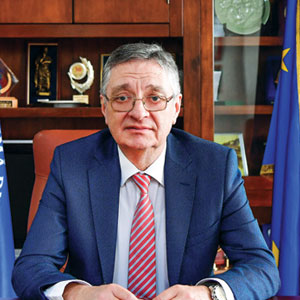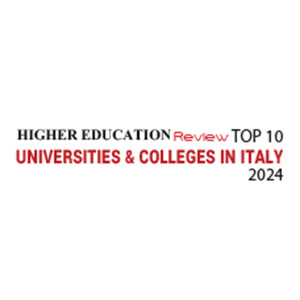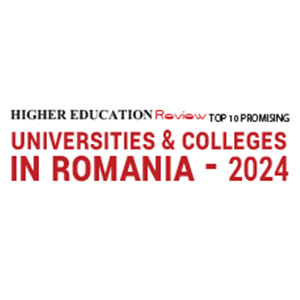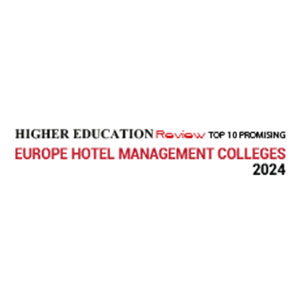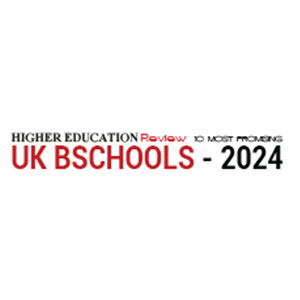Constanta Maritime University: Nurturing Competence & Practical Skills For Global Maritime Excellence
By Prof. Cornel Panait (Ph.D.), Professor
The higher education landscape in Romania is undergoing a transformative shift, anticipating a dynamic and inclusive future. Institutions are evolving to meet the changing needs of learners and society. A key focus is on lifelong learning and continuous skill development, aligning with the demands of a rapidly evolving job market. Higher education institutions are poised to offer flexible, modular programs tailored for working professionals and adult learners. Anticipated trends include the rising popularity of microcredentials as recognized alternative credentials.
Romania is also expected to attract more international students due to its diverse array of degree programs, including emerging specializations. The country's university degree system, recognized globally, emphasizes transparency and improved employability through bilingual Diploma Supplements. Additionally, Romania stands out with lower tuition fees, affordable living costs, rich cultural experiences, UNESCO world heritage sites, and high-speed internet connectivity.
Established in 1972 as the Merchant Maritime Institute, the institution underwent a transition to civilian status in 1990. Subsequently, in 2000, it rebranded as Constanta Maritime University. Currently, it holds the status of a public university accredited by the Romanian Quality Assurance Agency, receiving the highest accolade for quality assurance—an acknowledgment of the institution's utmost confidence in maintaining quality standards.
Constanta Maritime University presently boasts an enrollment of over 4000 students across various undergraduate Bachelor’s and Master’s programs, standing as the sole merchant marine university in the country. The Bachelor’s studies adhere to the initial Bologna academic cycle, spanning four years, encompassing three majors in traditional maritime domains and five in shipping-related fields.
Notably, international students are encouraged to enroll in English-taught specializations, including Navigation and Waterborne Transport, Marine Engineering, with specific competences tailored to their respective fields, emphasizing skills such as voyage planning, operation of naval engines, and management of electrical machinery.
Graduates receive engineering diplomas, and those aspiring to pursue maritime officer careers must obtain a seaman’s book from their country's Naval Authority. CMU facilitates onboard training through partnerships with local shipping agencies. The curriculum's uniqueness lies in its focus on enhancing employability skills, incorporating courses on communication, maritime multiculturalism, ethics, and cyber security. Equipped with up-to-date digital resources, AI technologies, and VR tools, students are prepared for global work environments.
English, The eCampus platform provides a repository of resources for personal and professional development, while CMU's certification as a Marlins Test Center aids in assessing Maritime English levels for recruitment and training.
“In designing the curriculum for each program, we prioritize a blend of theoretical and hands-on training essential for market competitiveness. For maritime specializations, onboard training commences in the second year through ERASMUS+ partnerships with crewing agencies. Practical training for maritime-related fields occurs at partner institutions, like port operating companies and national agencies, under bilateral agreements. External funding ensures broad student access to internships, and EU-funded projects with private sector stakeholders organize workshops and seminars, enhancing practical skills for improved employability”, shares Prof. Cornel Panait, Ph.D.
Constanta Maritime University (CMU) is strategically located in Constanta town, with its primary headquarters housing the Faculty of Navigation and Naval Transport, administrative facilities, auditoriums, conference rooms, a publishing house, dormitories, and the university library. An additional site on Siutghiol lake accommodates the Faculty of Marine Engineering, featuring teaching and administrative departments, auditoriums, a multifunctional laboratory, a welding workshop, dormitories, and a canteen. The lake venue is utilized for students' seamanship activities and practical training during the summer. CMU offers three hostels with modern amenities and internet access for over 500 students, complemented by recreational facilities along the lake's banks.
The university boasts high-quality infrastructure, including modern lecture halls, state-of-the-art simulators, laboratories, and digital learning facilities. Simulators and laboratories cover a wide range of maritime and engineering aspects, providing hands-on training opportunities. Faculty members actively participate in international conferences and workshops, fostering continuous professional development. The simulator training staff undergoes certification and recertification, ensuring up-to-date expertise.
Research projects at CMU focus on maritime education and training, emphasizing best practices and quality assurance. Collaboration with the private sector and strategic partnerships enhance the university's resources. Faculty members engage in exchange initiatives under programs like ERASMUS+, contributing to a global academic perspective. The university conducts regular performance evaluations, encompassing self-evaluations, student assessments, and peer evaluations, fostering continuous improvement and adherence to institutional standards. CMU stands as a dynamic institution committed to providing cutting-edge education in maritime and marine engineering fields.
Constanta Maritime University (CMU) is dedicated to the continual enhancement of its educational offerings, staying attuned to the evolving needs of the global industry. Regular reviews and updates of curricula align programs with industry trends, technological advancements, and workforce requirements. Certification by the Ministry of Education and the Romanian Agency for Quality Assurance in Higher Education ensures the quality of all study programs, with seafaring specializations further approved by the Romanian Naval Authority to meet international STCW standards.
CMU has forged partnerships with industry stakeholders, fostering mandatory practical training for all Bachelor's specializations. These collaborations provide students with invaluable insights into industry practices. The Career Counseling and Guidance Center actively supports students in their career development, connecting them with employers through job fairs and recruitment events. The university's graduates boast above-average employability rates.
Continuous improvement is a priority, with feedback from employers, alumni, and industry partners driving curriculum revisions and strategic priorities. A diverse portfolio of partnerships, including corporations and professional associations, contributes to identifying emerging skill requirements and industry trends. Practical training is integral, offering students real-world experience, while industry professionals are regularly invited to deliver guest lectures and workshops, enriching the learning experience.
The examination committee for graduation includes industry experts, ensuring graduates possess the skills necessary for labor market absorption. CMU's commitment to dynamic collaboration and industry integration positions it as a leader in preparing students for successful careers in the maritime and engineering sectors.
For the years to come, CMU's development strategy focuses on enhancing international programs in English, collaborating with foreign institutions. Lifelong training initiatives provide micro-certifications for students, aligning with labor market needs. The educational programs correlate with ESCO-defined occupations and competencies, ensuring relevance and alignment with European Skills, Competences, and Education standards.
CMU's commitment to dynamic collaboration & industry integration positions it as a leader in preparing students for successful careers in the maritime & engineering sectors
Romania is also expected to attract more international students due to its diverse array of degree programs, including emerging specializations. The country's university degree system, recognized globally, emphasizes transparency and improved employability through bilingual Diploma Supplements. Additionally, Romania stands out with lower tuition fees, affordable living costs, rich cultural experiences, UNESCO world heritage sites, and high-speed internet connectivity.
Established in 1972 as the Merchant Maritime Institute, the institution underwent a transition to civilian status in 1990. Subsequently, in 2000, it rebranded as Constanta Maritime University. Currently, it holds the status of a public university accredited by the Romanian Quality Assurance Agency, receiving the highest accolade for quality assurance—an acknowledgment of the institution's utmost confidence in maintaining quality standards.
Constanta Maritime University presently boasts an enrollment of over 4000 students across various undergraduate Bachelor’s and Master’s programs, standing as the sole merchant marine university in the country. The Bachelor’s studies adhere to the initial Bologna academic cycle, spanning four years, encompassing three majors in traditional maritime domains and five in shipping-related fields.
Notably, international students are encouraged to enroll in English-taught specializations, including Navigation and Waterborne Transport, Marine Engineering, with specific competences tailored to their respective fields, emphasizing skills such as voyage planning, operation of naval engines, and management of electrical machinery.
Graduates receive engineering diplomas, and those aspiring to pursue maritime officer careers must obtain a seaman’s book from their country's Naval Authority. CMU facilitates onboard training through partnerships with local shipping agencies. The curriculum's uniqueness lies in its focus on enhancing employability skills, incorporating courses on communication, maritime multiculturalism, ethics, and cyber security. Equipped with up-to-date digital resources, AI technologies, and VR tools, students are prepared for global work environments.
English, The eCampus platform provides a repository of resources for personal and professional development, while CMU's certification as a Marlins Test Center aids in assessing Maritime English levels for recruitment and training.
“In designing the curriculum for each program, we prioritize a blend of theoretical and hands-on training essential for market competitiveness. For maritime specializations, onboard training commences in the second year through ERASMUS+ partnerships with crewing agencies. Practical training for maritime-related fields occurs at partner institutions, like port operating companies and national agencies, under bilateral agreements. External funding ensures broad student access to internships, and EU-funded projects with private sector stakeholders organize workshops and seminars, enhancing practical skills for improved employability”, shares Prof. Cornel Panait, Ph.D.
Backed by State-of-the-Art Facilities
Constanta Maritime University (CMU) is strategically located in Constanta town, with its primary headquarters housing the Faculty of Navigation and Naval Transport, administrative facilities, auditoriums, conference rooms, a publishing house, dormitories, and the university library. An additional site on Siutghiol lake accommodates the Faculty of Marine Engineering, featuring teaching and administrative departments, auditoriums, a multifunctional laboratory, a welding workshop, dormitories, and a canteen. The lake venue is utilized for students' seamanship activities and practical training during the summer. CMU offers three hostels with modern amenities and internet access for over 500 students, complemented by recreational facilities along the lake's banks.
The university boasts high-quality infrastructure, including modern lecture halls, state-of-the-art simulators, laboratories, and digital learning facilities. Simulators and laboratories cover a wide range of maritime and engineering aspects, providing hands-on training opportunities. Faculty members actively participate in international conferences and workshops, fostering continuous professional development. The simulator training staff undergoes certification and recertification, ensuring up-to-date expertise.
Research projects at CMU focus on maritime education and training, emphasizing best practices and quality assurance. Collaboration with the private sector and strategic partnerships enhance the university's resources. Faculty members engage in exchange initiatives under programs like ERASMUS+, contributing to a global academic perspective. The university conducts regular performance evaluations, encompassing self-evaluations, student assessments, and peer evaluations, fostering continuous improvement and adherence to institutional standards. CMU stands as a dynamic institution committed to providing cutting-edge education in maritime and marine engineering fields.
Education that Meets Industry Needs
Constanta Maritime University (CMU) is dedicated to the continual enhancement of its educational offerings, staying attuned to the evolving needs of the global industry. Regular reviews and updates of curricula align programs with industry trends, technological advancements, and workforce requirements. Certification by the Ministry of Education and the Romanian Agency for Quality Assurance in Higher Education ensures the quality of all study programs, with seafaring specializations further approved by the Romanian Naval Authority to meet international STCW standards.
CMU has forged partnerships with industry stakeholders, fostering mandatory practical training for all Bachelor's specializations. These collaborations provide students with invaluable insights into industry practices. The Career Counseling and Guidance Center actively supports students in their career development, connecting them with employers through job fairs and recruitment events. The university's graduates boast above-average employability rates.
Continuous improvement is a priority, with feedback from employers, alumni, and industry partners driving curriculum revisions and strategic priorities. A diverse portfolio of partnerships, including corporations and professional associations, contributes to identifying emerging skill requirements and industry trends. Practical training is integral, offering students real-world experience, while industry professionals are regularly invited to deliver guest lectures and workshops, enriching the learning experience.
The examination committee for graduation includes industry experts, ensuring graduates possess the skills necessary for labor market absorption. CMU's commitment to dynamic collaboration and industry integration positions it as a leader in preparing students for successful careers in the maritime and engineering sectors.
For the years to come, CMU's development strategy focuses on enhancing international programs in English, collaborating with foreign institutions. Lifelong training initiatives provide micro-certifications for students, aligning with labor market needs. The educational programs correlate with ESCO-defined occupations and competencies, ensuring relevance and alignment with European Skills, Competences, and Education standards.
Prof. Cornel Panait (Ph.D.), Professor, Constanta Maritime University
CMU's commitment to dynamic collaboration & industry integration positions it as a leader in preparing students for successful careers in the maritime & engineering sectors

